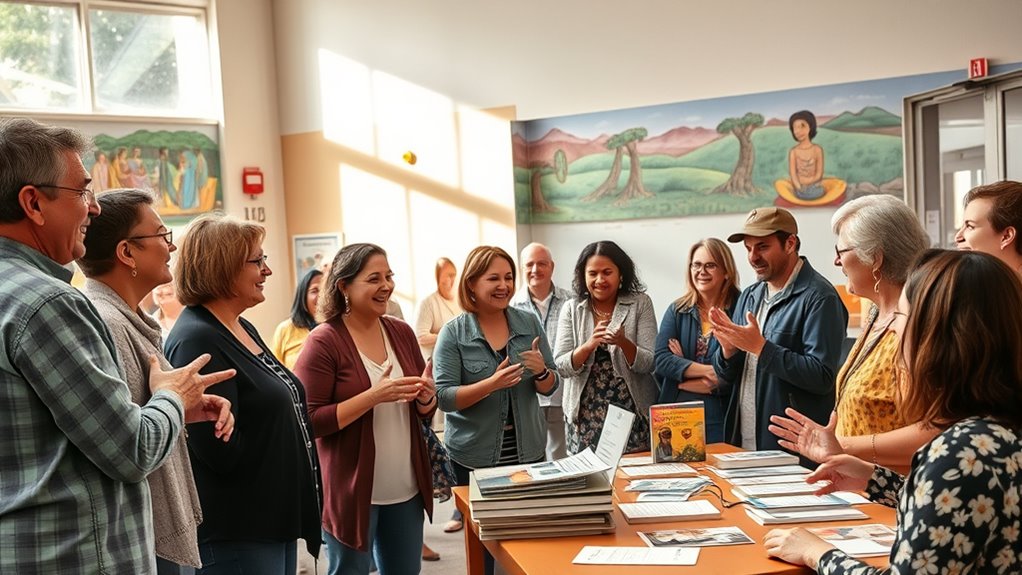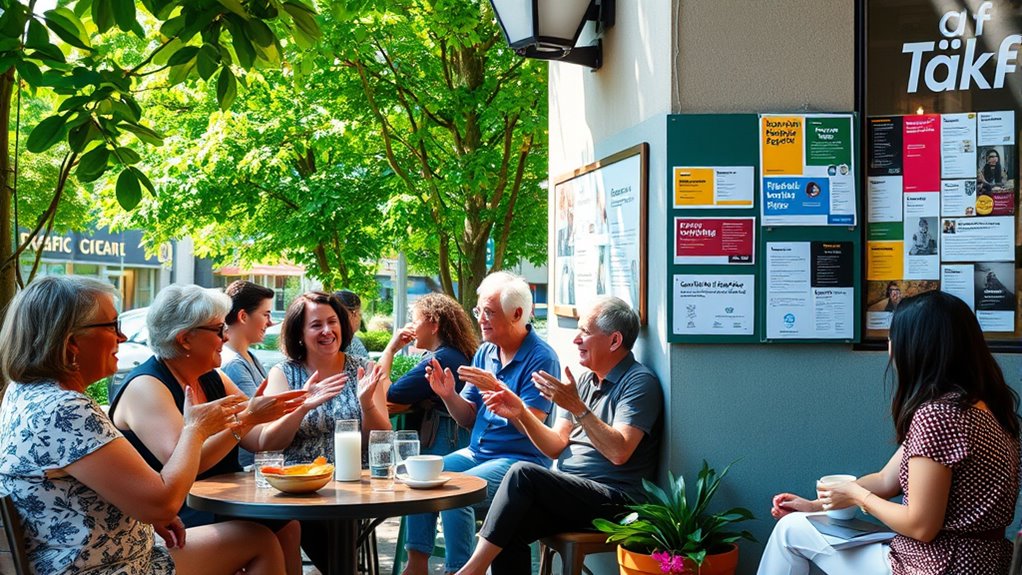To build a support network as a Deaf adult, start by connecting with local organizations like the Association of Late Deafened Adults (ALDA). Attend Deaf events, cultural festivals, and community picnics to meet others. Get involved in youth leadership conferences and storytelling nights for meaningful connections. Utilize social media to find like-minded individuals, and engage in activities that uplift your community. By nurturing these connections, you’ll discover even more ways to enrich your social life and sense of belonging.
Key Takeaways
- Join local Deaf organizations and support groups like ALDA for connection and shared experiences among Deaf adults.
- Attend Deaf cultural events and community activities to socialize and build relationships within the Deaf community.
- Utilize social media platforms to connect with other Deaf individuals and share personal stories for mutual support.
- Participate in Deaf youth leadership conferences and storytelling nights to network and engage with others in meaningful ways.
- Advocate for accessibility in communication, ensuring you have the tools and resources needed to foster connections.
Building Connections in Community

When you seek to build connections in your community, consider the importance of deaf-friendly dining experiences. These spaces not only foster social interactions but also create an inclusive environment where everyone can engage comfortably. Additionally, creating spaces for deaf individuals to express their experiences and frustrations is essential for effective community engagement. Incorporating mindfulness practices in these gatherings can enhance emotional well-being and facilitate deeper connections among participants. Such initiatives can be further supported by implementing science-backed strategies to ensure a welcoming atmosphere for all attendees. Providing accessible environments ensures that everyone, including those with varying communication needs, can participate fully in social activities. Moreover, hosting themed breakfasts can create unique opportunities for connection and engagement within the community.
Deaf-Friendly Dining Experiences
Deaf-friendly dining experiences are essential for fostering connections within the Deaf community while promoting inclusivity. Restaurants like Molly Moon’s in Seattle and Mozzeria in San Francisco employ staff trained in American Sign Language, making communication seamless. At Pah in Portland, you’ll enjoy a menu that celebrates Deaf culture, while Crêpe Crazy in Austin guarantees easy ordering through sign language. Supporting these deaf-friendly restaurants enhances accessibility and fosters a sense of belonging in the community. Additionally, many of these establishments offer poolside entertaining options, allowing diners to enjoy a refreshing atmosphere while socializing. Utilizing effective hydration techniques like staying hydrated while dining can contribute to overall well-being. Moreover, incorporating spiritual principles into community gatherings can create a deeper bond among participants. Using technology, like self-service kiosks and electronic tablets with ASL interpretation, enhances accessibility and promotes advanced convenience in dining experiences. Supporting Deaf-owned establishments not only strengthens the community but also encourages awareness and understanding.
Vibrant Deaf Communities

Joining cultural centers and attending local Deaf events can enrich your experience as a Deaf adult. You might discover hidden art spaces that showcase unique perspectives and creativity within the community. Engaging in these activities not only strengthens your connection but also celebrates the vibrant culture around you, including the rich expressions of Deaf arts. Additionally, collaborating with other Deaf individuals can provide opportunities for shared experiences that enhance your understanding of the community’s diverse narratives. Many individuals in the Deaf community find support networks crucial for navigating challenges and fostering a sense of belonging, as these networks often provide emotional support during difficult times. Furthermore, having a strong support system can significantly improve resilience and coping mechanisms when facing life’s challenges.
Cultural Centers and Events
Cultural centers and events play an essential role in fostering vibrant Deaf communities, as they create spaces where individuals can connect, share, and celebrate their unique culture.
These gatherings strengthen bonds through social interactions and cultural exchanges, allowing you to express your identity through sign language and visual arts. Additionally, these centers often feature Aboriginal art that reflects the rich cultural heritage of Indigenous peoples, enhancing the diversity of cultural expressions present. Events such as cultural festivals in Washington D.C. celebrate community spirit and diversity, offering a platform for Deaf individuals to showcase their talents. Establishing effective co-parenting plans can also provide a sense of community support for those navigating family dynamics. Furthermore, the presence of supernatural lore in various cultures can inspire creative expressions at these events, allowing for deeper connections through storytelling.
Accessibility is improved via technology and social media, ensuring more people can participate. Additionally, these events can help raise awareness about employment rates for deaf people, highlighting the importance of supporting career development within the community.
Cultural centers act as hubs for activities, preserving Deaf culture and providing resources for community engagement. They also promote education and awareness, bridging gaps between Deaf and hearing individuals. This engagement is crucial for fostering understanding and collaboration among diverse communities.
Participating in these events enhances networking and career opportunities, empowering you to thrive in both personal and professional spheres.
Undiscovered Local Art Spaces
Exploring undiscovered local art spaces can open up new avenues for connection and expression within vibrant Deaf communities. These galleries often showcase themes that resonate deeply with both Deaf and hearing audiences, emphasizing cultural identity and representation. You’ll find exhibitions like “6×6 Deaf Pride,” featuring diverse artworks from Deaf artists that challenge perceptions and promote inclusivity. Many spaces incorporate accessibility features, such as sign language interpretation, ensuring everyone can engage with the art. Collaborations between art centers and Deaf organizations further elevate the visibility of Deaf artistry. The current exhibit “Cultivating Connections” highlights local artists from various counties, reinforcing the importance of community engagement. Additionally, the promotion of financial aid sources can help support these art initiatives, ensuring they remain accessible to all members of the community. Art plays a crucial role in cultural expression, fostering understanding and appreciation across diverse audiences. Engaging with these spaces can lead to improved social interactions among peers, echoing the community-building benefits found in various artistic endeavors. Inspirational messages can transform everyday experiences into opportunities for deeper connections and expression.
Attend Local Deaf Events
Attending local Deaf events is a fantastic way to connect with your community and celebrate Deaf culture. These gatherings offer a vibrant atmosphere filled with opportunities to learn, socialize, and engage. Here’s a glimpse of some popular events you might consider:
| Event Type | Purpose |
|---|---|
| Deaf Cultural Festivals | Celebrate culture through performances and art |
| ASL Storytelling Nights | Experience visual storytelling and community |
| Deaf Youth Leadership Conferences | Empower young leaders with networking |
| Deaf Community Picnics | Casual gatherings for socializing |
| Deaf Film Festivals | Showcase Deaf artists and filmmakers |
In 2024, there will be exciting events planned for the deaf community that include workshops designed to foster learning and engagement, making it an ideal time to explore smart shopping techniques for the best deals on event tickets. Many of these events are held in cities that have vibrant Deaf communities, ensuring a rich experience filled with cultural connections.
Deaf-Owned Restaurants

When you explore Deaf-owned restaurants, you’ll discover an exciting array of culinary highlights that showcase regional flavors. Many of these eateries also offer unique craft beers and ciders to complement your meal, along with gourmet tasting menu options that elevate the dining experience. These establishments not only serve delicious food but also contribute to creating a stronger sense of community for deaf individuals. Whether you’re a foodie or just curious, these restaurants provide a delicious way to connect with Deaf culture and community.
Culinary Highlights of the Region
Deaf-owned restaurants not only offer delicious cuisine but also create unique environments that celebrate deaf culture and communication.
At Mozzeria in San Francisco, you can savor authentic Neapolitan-style pizzas, crafted by certified deaf pizza-makers. All staff members are deaf, addressing employment challenges faced by the deaf community and creating a supportive work environment.
OneSense by Valla in Rome features seasonal Italian dishes, while Pi00a in Los Angeles serves innovative Asian-fusion pizzas like Miso Eggplant.
These establishments prioritize hiring deaf individuals, emphasizing skill development and leadership opportunities.
They use visual communication methods, creating an inclusive atmosphere where everyone feels welcome.
Dining at these restaurants goes beyond food; it’s an experience that challenges stereotypes and promotes community support.
Your visit not only satisfies your taste buds but also uplifts the deaf community, fostering a network of empowerment and inclusivity.
Craft Beer and Cider
Craft beer and cider have become exciting avenues for celebrating Deaf culture, with several breweries leading the way in creating inclusive environments.
When you visit these Deaf-owned establishments, you’ll find:
- Streetcar 82 Brewing Co. – The first Deaf-owned brewery east of the Mississippi, it hosts community events and ASL classes, fostering connections. The brewery is known for its focus on sign language communication among customers.
- Lochiel Brewing – Known for its Scottish-inspired beers, this Arizona gem promotes Deaf culture while offering a welcoming space for all.
- Veditz and Company Brewing – Named after a Deaf leader, it organizes “Sip & Sign” events to teach ASL, bridging gaps between communities.
These breweries not only empower Deaf individuals through employment but also enrich local culture, making them essential spots for socializing and support.
Gourmet Tasting Menu Options
Exploring gourmet tasting menus at Deaf-owned restaurants opens up a world of unique culinary experiences that blend diverse flavors with inclusive communication. You can savor a variety of cuisines, from Italian at Mozzeria to oriental delights at 1000&1 Signes, all while enjoying an environment that embraces Deaf culture. These restaurants often use Sign Language, graphic menus, and visual ordering systems, making dining both accessible and engaging. For instance, Silent Cake in China employs ten Deaf individuals among its staff, ensuring a focus on inclusivity and communication. As you explore dishes, you’ll also contribute to community pride and employment opportunities for Deaf individuals. Plus, you might even pick up some basic Sign Language, enhancing your dining experience and fostering cultural exchange. Enjoy a meal that’s not just about food but also about connection and inclusivity.
Must-See Sights

When you explore must-see sights as a Deaf adult, consider visiting historic Deaf institutions that celebrate your culture and heritage. Don’t miss breathtaking national parks that offer stunning visual experiences, and check out Deaf cultural festivals for a lively community atmosphere. Joining local Deaf clubs can also enrich your travels and help you connect with others who share your experiences. Additionally, be sure to visit the Dyer Arts Center at the Rochester Institute of Technology, which showcases the work of Deaf and hard of hearing artists.
Historic Deaf Institutions
If you’re looking to deepen your understanding of deaf culture and history, visiting historic deaf institutions is a must.
These sites showcase the evolution of deaf education and community. Here are three key institutions to take into account:
- American School for the Deaf (ASD): Established in 1817, it’s one of the oldest schools for the deaf in the U.S., emphasizing both education and culture.
- Gallaudet University: Founded in 1864, this is the world’s only liberal arts university specifically for deaf and hard-of-hearing students, fostering a unique academic environment.
- Royal Institution of Deaf and Mutes: Founded in 1760 by Abbe de l’Epee, this pioneering institution laid the groundwork for modern deaf education.
Exploring these historic sites will enrich your appreciation of the deaf community’s resilience and achievements.
Breathtaking National Parks
National parks offer breathtaking sights that captivate every nature lover.
You’ll find diverse landscapes, from Acadia’s rugged coastline to the stunning mountain vistas of Grand Teton. If you’re seeking unique geological wonders, don’t miss Carlsbad Caverns.
Many parks, like Bryce Canyon, feature accessible trails, ensuring everyone can enjoy their beauty. You can hike the Figure-8 Combination Trail for unforgettable views of hoodoos or take a scenic drive around Crater Lake, the deepest lake in the U.S. For a unique experience, try rafting in Big Bend or witnessing the first sunrise at Acadia, where you can also enjoy biking near Jordan Pond for stunning fall colors.
With plenty of recreational activities, these parks provide a perfect backdrop for creating lasting memories in nature’s embrace.
Deaf Cultural Festivals
After exploring the stunning landscapes of national parks, consider immersing yourself in the vibrant world of Deaf cultural festivals.
These events celebrate Deaf arts, sports, and community, offering unforgettable experiences. Here are three must-see festivals:
- Clin d’Oeil Festival (Reims, France): Witness incredible Deaf performing arts, including theatre, dance, and film.
- Toronto International Deaf Film and Arts Festival (TIDFAF): Enjoy a showcase of talented Deaf filmmakers and artists from around the globe.
- Deaflympics: Join this international multi-sport event that fosters community and cultural exchange among Deaf athletes; it has been held every four years since 1924.
Attending these festivals not only enriches your understanding of Deaf culture but also helps you connect with others who share similar experiences.
Join Local Deaf Clubs
Joining local Deaf clubs can greatly enrich your life as a Deaf adult, offering a vibrant space for connection and support. These clubs provide a safe environment where you can socialize, share experiences, and build essential skills. Deaf clubs are vital for advocating Deaf rights and fostering a strong sense of community. Through various events—like holiday parties, lectures, and athletic outings—you’ll engage with Deaf culture, enhancing your sense of identity. You’ll also access important resources and information that can empower you in your daily life. While some clubs face challenges, your participation can help keep them thriving.
Practical Tips

When you’re planning to connect with your support network, knowing how to get there and get around can make a big difference. It’s also helpful to contemplate the best time to visit and where to stay for ideal experiences. Plus, being aware of local etiquette guarantees you engage respectfully and meaningfully with others. Additionally, fostering an inclusive environment can help promote awareness of communication preferences within your support network.
Getting There
Building a support network as a Deaf adult can feel intimidating, but taking practical steps can make the process smoother. Here are three tips to help you get there:
- Engage with Your Community: Join Deaf groups and participate in workshops to connect with others who share your experiences. These spaces offer valuable insights and support, and can also help you address systemic barriers that impact the Deaf community.
- Utilize Technology: Make use of assistive devices, communication apps, and captioning services. These tools can enhance your interactions and make communication more accessible.
- Prioritize Clear Communication: Always face the person you’re speaking with, use visual aids, and minimize background noise. These adjustments create a more inclusive environment for everyone involved.
Getting Around
Maneuvering transportation as a Deaf adult can present unique challenges, but with the right strategies, you can make the experience smoother and more manageable.
Start by planning your route ahead of time; check for stops, delays, and estimated arrival times. Utilize transportation apps for real-time updates so you won’t miss any essential information. Always print or write down your itinerary to have it accessible, even without phone reception.
When using public transport, select seats facing information screens to catch visual announcements. Don’t hesitate to ask for assistance from kind strangers or inform staff about your hearing loss for better support. Additionally, familiarize yourself with the estimated time of arrival to manage your expectations during the journey.
Finally, stay aware of your surroundings for safety, and consider traveling with a buddy for added security.
Best Time to Visit
Choosing the best time to visit a destination as a Deaf adult can greatly enhance your experience, especially if you consider seasonal events and accessibility options. Here are some practical tips to keep in mind:
- Seasonal Events: Summer often has outdoor activities, while winter features accessible performances and festivals.
- Spring and autumn provide mild weather for enjoyable outings.
- Cultural Activities: Attend Deaf cultural festivals or workshops. These events offer networking opportunities and celebrate Deaf identity. Additionally, consider seeking out mental health professionals with specific training in deaf culture to support your well-being during your travels.
- Accessibility Options: Look for venues with sign language interpretation, captioning, and trained staff.
Many museums and theaters now cater to Deaf visitors, enhancing your experience.
Where to Stay
When looking for the right place to stay as a Deaf adult, it’s crucial to contemplate options that prioritize communication and comfort. Consider Deaf-friendly living options that cater to your needs, such as independent living communities, assisted living facilities, or skilled nursing centers. Always check for accessibility features like ASL interpreters, technology integration, and staff trained in sign language. Staff training is critical for ensuring effective communication and care for residents.
| Living Option | Key Features |
|---|---|
| Deaf Independent Living Communities | Shared amenities, various price points |
| Deaf Assisted Living Facilities | Daily assistance, social activities |
| Deaf Skilled Nursing Centers | ASL-trained staff, long-term care |
| Hospice Care | End-of-life support, insurance coverage |
Evaluate each option carefully to find the best fit for your lifestyle.
Local Etiquette
Understanding local etiquette can greatly enhance your interactions as a Deaf adult, especially in social settings.
Here are some practical tips to keep in mind:
- Attention Getting: Use respectful methods like waving, tapping a shoulder, or flickering lights to get someone’s attention.
- Communication Preferences: Always ask about preferred communication methods, whether it’s sign language, writing, or speaking. Giving time for responses is also crucial to ensure effective communication.
- Visual Clarity: Guarantee good lighting and avoid standing with the light behind you to facilitate lip-reading.
Pro Tip
Building a support network as a Deaf adult can greatly enhance your quality of life. Start by identifying support groups like the Association of Late Deafened Adults (ALDA) to connect with others. Engage in Deaf culture by participating in local events, which fosters valuable relationships. Utilize communication tools such as captioning services to improve interaction. Educate your family and friends about your hearing loss to enhance understanding. Access professional services from audiologists for effective management of your hearing challenges. Prioritize face-to-face interactions, speak clearly, and reduce background noise to facilitate better communication. Additionally, consider the importance of accessibility techniques to ensure that your environment is accommodating and supportive of your communication needs. Finally, embrace your Deaf identity, learn sign language, and stay informed about assistive technologies to empower yourself in various situations.
Frequently Asked Questions
How Can I Find Local Deaf Events in My Area?
To find local Deaf events in your area, start by checking community centers dedicated to the Deaf and hard of hearing.
Look for online event calendars or join social media groups focused on Deaf culture.
Attend ASL classes to meet new people and learn about happenings.
Subscribe to newsletters from Deaf organizations for updates.
Don’t forget to explore local cultural workshops and community festivals to connect with others and participate in the vibrant Deaf community.
What Resources Are Available for Deaf Mental Health Support?
Finding mental health support as a deaf individual can feel like searching for a needle in a haystack!
Fortunately, numerous resources exist. You can connect with specialized providers through directories like NASADHH, ensuring they understand your unique experiences.
Online counseling offers videoconferencing with ASL interpreters, making therapy accessible.
Don’t forget about hotlines like the National Deaf Domestic Violence Hotline, providing 24/7 support.
Building connections with deaf community groups can also enhance your mental well-being.
How Can I Improve My Sign Language Skills?
To improve your sign language skills, immerse yourself in various learning environments like ASL classes, online courses, or community workshops.
Practice basic signs and the finger alphabet, then expand your vocabulary with common phrases. Engage in conversations with ASL users and find practice buddies to enhance your skills.
Attend Deaf community events for real-life practice and cultural understanding.
Finally, utilize video resources for visual guidance and seek feedback from experienced signers to refine your technique.
Are There Online Communities for Deaf Adults?
In the digital age, think of online communities for deaf adults as modern-day amphitheaters, where voices resonate through screens.
Yes, there are various online platforms where you can connect with others. Communities like SayWhatClub and HLAA offer spaces for sharing experiences and support.
You’ll find ASL resources, health discussions, and cultural engagement, reducing isolation and empowering you to enhance your health literacy while fostering valuable connections with peers.
What Legal Rights Do Deaf Adults Have in the Workplace?
As a Deaf adult, you have specific legal rights in the workplace under the Americans with Disabilities Act (ADA).
This law protects you from discrimination based on your deafness and guarantees you receive reasonable accommodations to perform your job effectively.
Employers must engage with you to identify suitable accommodations, such as sign language interpreters or assistive technologies.
If faced with discrimination, you can file a complaint with the Equal Employment Opportunity Commission (EEOC).
Conclusion
Building a support network as a deaf adult isn’t just about finding connections; it’s about creating a vibrant community where you truly belong. Whether you’re exploring deaf-owned restaurants or discovering local sights, each interaction strengthens your ties. So, why not take that first step today? Remember, every relationship you nurture adds to your support system, making your journey richer and more fulfilling. Embrace the opportunities around you, and watch your community thrive.











